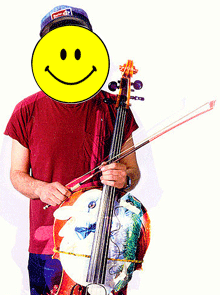 by guest blogger Corey Dargel
by guest blogger Corey Dargel
The late Robert Solomon was a professor of philosophy at the University of Texas. He had a very fun cameo in the animated film Waking Life.
Solomon created a lecture series called Philosophy and the Intelligence of Emotions. One of the lectures was titled “Laughter and Music.”
Solomon argued that laughter has very little to do with what’s funny and what’s not funny. Rather, he believed that laughter is a bonding mechanism; its primary purpose is to create a feeling of connection between members of a certain group. That’s why people are more likely to laugh at a movie when they’re watching it with a group of people than when they’re watching it alone. That’s also why racially oriented jokes, for example, are funny to some people and offensive (or at least unfunny) to others.
Solomon believes that music, like laughter, is primarily a bonding mechanism. Just as people’s senses of humor depend on the groups they associate with, so do people’s feelings about music depend on the context in which they experience it.
To be sure, music and laughter can still have a bonding effect on someone who listens alone to a recording. Even in that isolated context, there’s a sense of connection with the artists who made the recording and/or with other people who have listened to the recording.
If you ask someone why a piece of music is “sad,” they tend to give one of the following answers:
1) A piece of music is sad because it arouses sadness in the listener.
2) A piece of music is sad because it was sadness that the author or composer was expressing when he or she composed it.
But, alas, it’s not that simple.
Music that comforts some people can be used to torture other people. Conversely, I would bet that we’ve all had the experience of listening to a really depressing piece of music and yet feeling euphoric while listening to it. Also, the first time people hear a piece of music can sometimes set up a
powerful association that recurs on every subsequent hearing.
According to Solomon, recent research
suggests that adolescence is a special age of life when people are
particularly receptive to different kinds of music. Perhaps what they hear during that
time is something they carry with them, something that sets the
patterns of musical meaning for the rest of their lives.





